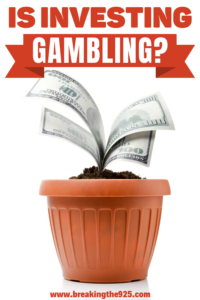Some people look at investors as daring risk-takers who play at all or nothing. They imagine investing as throwing the dice in the roulette wheel hoping that the ball will fall into your number. If this doesn’t happen, you’re done. But is that the hard truth? Is investing gambling?
If you are walking on the thin line between “investing is smart” and “don’t invest until you ready to lose it all” type of thinking, it’s time for clarification.
Investing is complex and may not be for everyone. However, no matter whether you are tempted to invest or see investing as a potential vice, you should make the distinction between investing and gambling.
No two notions, practices, or actions are the same. There can be similarities but there will always be differences.
It’s to put this matter to rest and answer the intriguing question about whether investing is just another form of gambling.

The Notorious Similarity Between Gambling and Investing
The bad reputation of investing and its connection to gambling can be linked to a single trait – risk.
Anyone hesitant about investing attributes these uncertainties to not wanting to risk the money.
Are these people right?
Well, yes, there is no doubt that investing carries some risk. Especially if you go at it without gathering the necessary information.
Both investing and gambling carry risk. Both offer you a choice. Both can take you downhill if you have no boundaries. And both investors and gamblers aim to enter “the game” with minimal risk and high gain.
The similarity that essentially triggered the comparison can’t be undermined. But there is a key difference within this similarity. In investing you have the choice not to gamble.
Investing CAN be gambling but doesn’t need to be. It’s all up to you. The investors can always choose to play it safe and go for the win, while gamblers rarely have this possibility (fixed matches aside).
The situation in which investing moves can be tied to a gambler’s moves is when you invest without technical or fundamental analysis. If you buy shares in a company without understanding how finance and business work or without assessing the current state of the market and economy, you will be gambling.
[convertkit form=2236261]
The Key Differences Between Gambling and Investing
We’ve established the unavoidable similarity, but what about the differences?
The differences exist, let’s make that clear. You’ve got the hint that the distinction lies in the ability to bring the risk to a minimum when investing. But now it’s time to elaborate more on the matter and introduce all the ways in which investing ISN’T gambling.
Investing is based on information and research
Investments that aren’t a gamble are those that are based on educated decisions. So, if you assess the risk, the economy, the expected return, and similar key factors, you can make low-risk investments.
These types of investments are more similar to saving. In traditional saving, you put your money into a savings account and accumulate interest. With the low-risk investment, you put your money in index funds, for example, and with time, you’ll get a higher return.
By now, some of you will prepare a rebuttal, stating how you can make informed decisions in gambling as well. But you simply can’t compare hearing that the table is hot to having insight into the company’s financial ratios, management teams, earnings, and so on.
Investing in company shares can be backed up with research analysis reports or direct assessment of publicly available company information. With the cards out in the open you will know what you are getting yourself into.
On the other hand, when you sit at a blackjack table, you have no idea how good the players or nor which cards will land in your hand. There’s the difference.
Investing pays off long-term
Another key difference is the time.
Gambling brings instant results – celebration or devastation. While investing demands time if you want to maximize the profit.
For example, if you buy shares in a company that pays dividends, you can be rewarded for the money you invest. No matter what occurs with your risk capital, the company will pay you if you hold onto its shares. So, investors who are in for making money over time, play on the returns from dividends card.
Patience and smart choices are rewarded in investing. In gambling, no time in the world can help you if you aren’t lucky.
Investing allows you to mitigate and manage risk
Imagine that you placed the bet on Manchester United as the winner of the Europa League final. Can you pull out a part of your money in the middle of the game if the outcome doesn’t seem promising? You can’t even think about it.
This leads us to yet another difference – loss mitigation.
Investing allows you to prevent complete loss of capital. Even if you do risk some money, you can limit it to a sum that won’t make a big difference to you.
There are many ways to reduce and manage investment risk. For example, you can place a stop-loss order on your investment. Setting a stop-loss order for, say, 10% below the price you paid for the shares will limit your loss. You can resell the shares and keep 90% of your invested capital.

Is Investing Gambling – The Final Answer (*Drumroll, Please*)
Are you gambling with your life when you drive a motorcycle without a helmet? Yes. Are you gambling with your relationship when you start meeting with someone on the side? Yes. Are you gambling with your money when you invest carelessly? Yes.
But this doesn’t make investing gambling, it makes the person with reckless investments a gambler.
To sum up, No, investing is not gambling, but yes, investors can be gamblers when they don’t make informative and data-driven decisions.
Investment is a world on its own with possibilities to analyse, choose, manage risk, plan, and ultimately, become a full-time investor. Investing helps people build empires and become respected and admired entrepreneurs. Can you say the same for gamblers?
